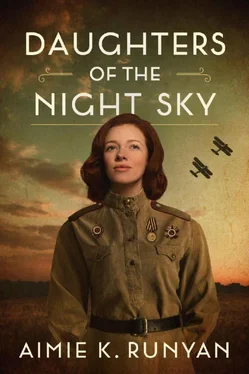By the second day on the rattling train, I had become acutely aware that the answer didn’t matter. My course was set, and I knew it was the one I needed to take.
When we arrived in Moscow, the interviewers organized us into groups, then had us wait in hard seats until they called us one by one to answer their volley of questions. They didn’t bother holding the interviews in heated buildings, but rather drafty tents that gave us little protection against the October chill. It was no accident. If any woman complained about the cold in a tent midday in the autumn, there was no way the army would accept her for flying missions in an exposed aircraft midwinter. I gave wordless praise for the woolen uniform and thick socks, and waited my turn while Taisiya buried herself in the newspaper. She left her manuals and texts in her valise so the others didn’t think she needed to cram for her interview. I leafed through one of my advanced flight-training manuals but found the words just swirled on the page.
A guard escorted me to the interviewing area. I avoided eye contact with any of the other recruits who had finished their questioning as they exited to the mess hall or the barracks. I didn’t want to read too much into their expressions. Was the major cruel, or was the pilot merely unused to his brusque military manner? I had no way of knowing, and it didn’t matter. When the alternative was spending my waking hours in a factory building tanks, or worse, cooped up in Miass knitting socks for the men at the front, to fail this interview would be a disaster.
A young lieutenant, only a few years older than I, took notes as Sofia Orlova herself presided over the interview. The young man had hair somewhere between brown and blond, watery blue eyes, and the weakest chin I had ever seen. He breathed with an irritating wheeze. The perfect sort of man to keep holed up in an office. Major Orlova looked mildly annoyed at his presence but ignored him with her quiet civility as he scratched out my responses to her questions on his notepad.
“Name?”
“Age?”
“Place of birth?”
The litany of questions progressed through all manner of expected topics relating to health, mental stability, and fortitude, but it wasn’t until they turned to technical experience with aircraft that I felt the muscles in my shoulders loosen, though I hadn’t realized how tense they had become. There was nothing in his dossier that would stump me. If she did not select me, it would not be for my deficiency, but for an overabundance of qualified pilots. That risk seemed remote.
Major Orlova shifted her gaze and attention from the papers before her to my face. She was scrutinizing not only my words, but also everything about my reaction to her final question.
“What calls you to serve Mother Russia as an aviator, Comrade Soloneva?”
The new surname still startled me, but I kept my expression impassive. I sat straighter in my chair and looked into her assessing eyes. “Major, because I was given a gift. I am an excellent navigator, and it is only thanks to the education I have received through the generosity of Mother Russia that I have been able to develop my skills. How could I, in good conscience, not use that gift to come to her aid in her hour of need?”
“Well said, Comrade Soloneva.”
I saluted the major and in the coming days, as I waited for her answer, was left with little occupation other than vision and medical screenings. Those of us who completed our interviews early had a few days of relative freedom while Major Orlova personally saw to the rest of the candidates. She insisted on selecting us herself. There were more than two hundred of us, after all, and choosing the best of us was not the task of a single morning. They did their best to keep tabs on our comings and goings, but I had to escape to Moscow on my own, if only for a few hours, to explore the city of my birth and early childhood.
Taisiya, as was her custom, was making friends with all the other women, learning who were the viable contenders and who was likely to be sent home. I had done my share of small talk, though, and sought the freedom of the streets, subdued by the great crowds of gathering troops. It wasn’t the safest decision I’d made, but who knew when I would have the chance to see the city again or what would be left of it when I did? Taisiya agreed to explain my absence as an urgent errand in the unlikely event my departure was noticed.
I grabbed Papa’s violin and wandered the streets of Moscow until I found the university. It had been more than a decade since I had seen the crumbling brick buildings that my father had so loved. They were full of his history—that which he lived, and that which he taught—and I wanted to be near them, just for a few hours before I left for training or returned to Miass. I removed the instrument, the finish faded so that only hints of the lovely russet color remained. I sat on the steps in front of the building where I was reasonably certain Papa had done the bulk of his teaching, and played his favorite tunes.
I paid no heed to the cold stone steps that chilled my spine, and very little to the scant crowd that buzzed about the campus that seemed unnaturally, uncomfortably quiet. I remembered the buildings humming with life and passion from both instructors and pupils. The war had claimed most of the youth and some of the staff; most of the rest had been evacuated to continue their studies in Turkmenistan. The grounds had taken on an abandoned feel—just as I imagined the old mining towns in the north looked like when the supply of ore was depleted. The conditions weren’t much different. The university had been stripped of its most precious commodity and was now left a haunted ruin.
A few passersby stopped to listen, some offering polite applause between songs. I smiled for them on occasion but mostly lost myself in Papa’s music. I’m not sure how long I played; it could have been an hour or three. By the time I placed the instrument back in its case, my fingers were numb from the exertion. But for a short time I felt just a little closer to my father and the life that should have been.
It was three days later that the rosters for the female regiments were posted in our makeshift barracks. Against all odds, Taisiya and I were both assigned to the 122nd Aviation Group, where we would presumably serve out the duration of the war.
“I knew they’d keep us,” Taisiya said, gripping me in a hug after we cleared the throng of pilots straining to see if they had been assigned.
“Easy to say so now that we have our answer,” I said, returning the hug, relief pulling the corners of my lips upward. “But we seemed to have more training than most. I’m hoping that means I’ll get a plane of my own.”
Taisiya narrowed her eyes for a moment. “Not just training—military training. That’s worth months, if not years, of civil experience,” she said, her face rapidly turning somber. She’d spent the past three days performing her own interviews on any recruit who would speak with her. She knew the rest of our division as well as Major Orlova by now. “But I’m glad it’s worked out for both of us. Serving without you, or being sent home while you got to serve, would have been awful.”
The thought of being stationed away from her caused my breathing to grow shallow. I’d considered being sent back while Taisiya got selected—she had more hours as a pilot than I did—but never the possibility that I would be placed in a regiment without her.
We reported to the lieutenant, the wheezy one who had assisted Orlova in interviews, for a short briefing, which concluded with instructions to relocate to the regular barracks on the other end of the grounds. By the time he dismissed us, the women who hadn’t been chosen for duty were already gone.
Читать дальше













